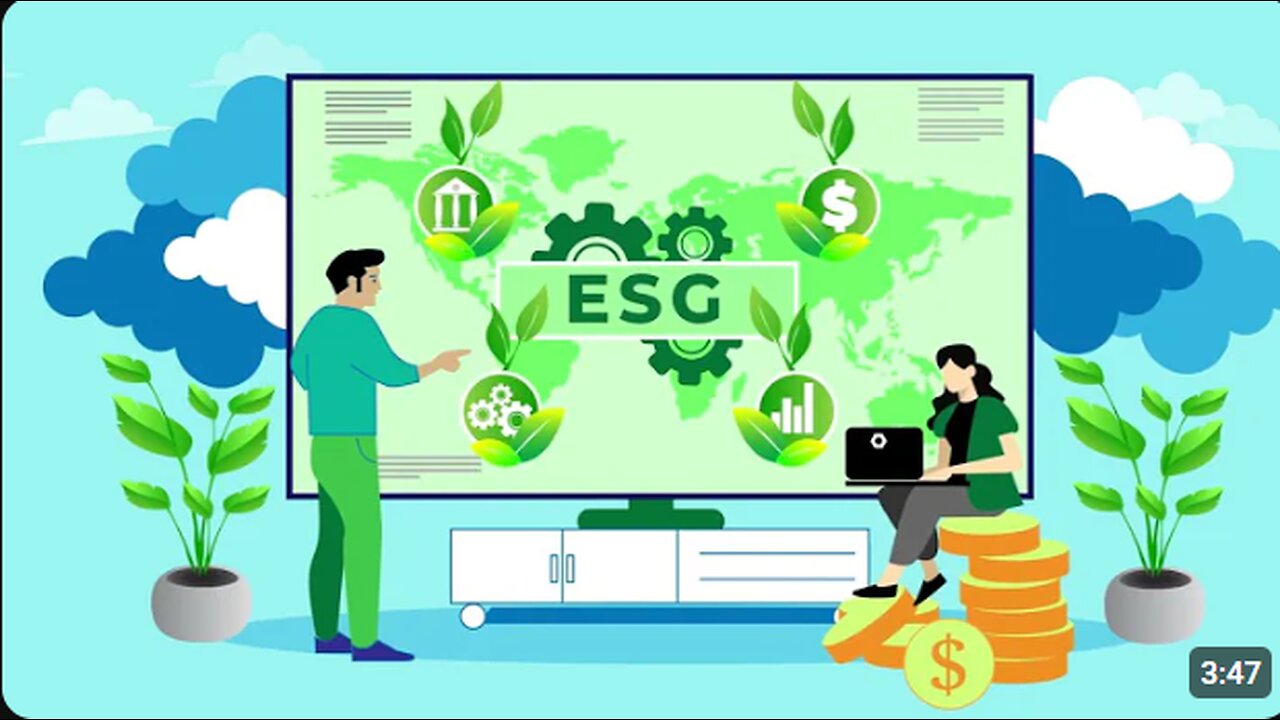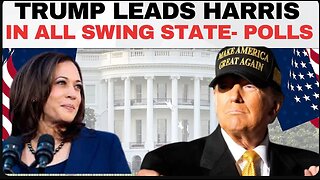Premium Only Content

SDG, DEI & ESG: HIDDEN POWER
Conspiracy theories surrounding the United Nations' Sustainable Development Goals (SDGs) often reflect deep-seated skepticism about global governance, perceived hidden agendas, and concerns over sovereignty and societal control. While the SDGs aim to address pressing global challenges such as poverty, inequality, climate change, and environmental degradation by 2030, critics argue that they are part of a larger, more sinister plan. Here, we delve into the main conspiracies surrounding the SDGs, the arguments presented by skeptics, and the counterarguments from proponents of sustainable development.
1. SDGs as Tools for Global Governance:
Loss of Sovereignty: One of the central conspiracy theories posits that the SDGs are a mechanism for eroding national sovereignty. Critics argue that by endorsing global goals and targets, countries are pressured to align their policies with international standards set by the UN and other global entities. This, they claim, undermines the ability of nations to make decisions independently, leading to a form of global governance where supranational organizations wield disproportionate influence.
Agenda 21 and Agenda 2030: Some conspiracy theorists link the SDGs to previous UN initiatives like Agenda 21, a non-binding action plan on sustainable development from the 1992 Rio Earth Summit. They argue that Agenda 21 laid the groundwork for Agenda 2030 (which includes the SDGs) and view both as steps towards a centralized, global authority that dictates environmental, economic, and social policies worldwide.
2. Economic and Technological Control:
Corporate Interests: Critics suggest that the SDGs serve the interests of multinational corporations rather than addressing grassroots needs. They argue that global corporations, through partnerships with the UN and other international bodies, use the SDGs to promote market-driven solutions that benefit corporate profits over genuine sustainable development.
Technological Surveillance: There are concerns that achieving certain SDG targets, such as those related to digital connectivity and smart cities, could lead to increased surveillance and control over populations. Critics fear that advances in technology under the guise of sustainable development could infringe on privacy rights and civil liberties.
3. Population Control and Social Engineering:
Reproductive Rights: Conspiracy theories often assert that certain SDG goals related to health and gender equality, particularly those advocating for reproductive rights and family planning, are part of a broader agenda for population control. Critics argue that these goals promote policies that undermine traditional family structures and cultural values.
Social Engineering: Some skeptics view the SDGs' focus on inclusivity, diversity, and gender equality as forms of social engineering aimed at reshaping societal norms and values. They argue that promoting these principles through global initiatives infringes on individual freedoms and national identities.
4. Environmental Concerns and Greenwashing:
Greenwashing: Critics accuse some corporations and governments of using the SDGs as a form of greenwashing, where they claim to support sustainable practices without making meaningful changes. This undermines genuine efforts to address environmental degradation and climate change, as companies may prioritize profit over environmental stewardship.
Resource Extraction: There are concerns that achieving certain environmental SDGs, such as those related to renewable energy and conservation, could lead to increased resource extraction and environmental degradation in developing countries. Critics argue that these activities perpetuate global inequalities and exploit natural resources for the benefit of wealthier nations.
5. Lack of Transparency and Accountability:
Democratic Deficit: Skeptics often criticize the lack of democratic accountability in the implementation and monitoring of the SDGs. They argue that decisions related to sustainable development are made by unelected officials and technocrats, bypassing democratic processes and sidelining the voices of affected communities.
Opaque Funding: There are concerns about the sources of funding for SDG initiatives, particularly from private foundations and corporations. Critics argue that opaque funding mechanisms undermine transparency and could lead to conflicts of interest, where donors influence the agenda and priorities of sustainable development projects.
Counterarguments from SDG Proponents:
Global Collaboration and Solidarity: Proponents argue that the SDGs represent a historic opportunity for global collaboration and solidarity to address shared challenges. By setting common goals and targets, countries can work together to achieve sustainable development in a coordinated manner.
Empowerment and Inclusivity: SDG supporters emphasize the principles of empowerment, inclusivity, and leaving no one behind. They argue that the goals prioritize the needs of marginalized and vulnerable populations, aiming to reduce inequalities within and among countries.
Scientific Basis and Evidence: The SDGs are grounded in scientific evidence and informed by extensive consultations with stakeholders worldwide. Proponents stress that the goals are based on data-driven analysis of global trends and challenges, ensuring that interventions are effective and sustainable.
Partnerships for Progress: Achieving the SDGs requires partnerships among governments, civil society, academia, and the private sector. Proponents highlight the importance of multi-stakeholder collaboration in mobilizing resources, sharing knowledge, and scaling up successful interventions.
Accountability and Monitoring: The SDGs include mechanisms for monitoring progress and holding stakeholders accountable for their commitments. Proponents advocate for transparency in reporting and regular reviews to assess implementation efforts and adjust strategies as needed.
Conclusion:
Conspiracy theories surrounding the SDGs reflect broader concerns about global governance, economic interests, and societal values. While critics raise legitimate questions about transparency, accountability, and unintended consequences, proponents argue that the SDGs represent a collective commitment to sustainable development and social progress. As the world works towards achieving the SDGs by 2030, it is crucial to engage in informed dialogue, address legitimate concerns, and leverage the goals as a framework for building a more equitable and sustainable future for all.
-
 5:40
5:40
TOWERCLIPS
1 month agoTrump VS Harris!! Who's gonna WIN?!
754 -
 5:07:03
5:07:03
SLS - Street League Skateboarding
5 days ago2024 SLS Super Crown São Paulo: Men's & Women's FINAL
1.29M40 -
 32:51
32:51
The Why Files
20 days agoCryptids 2: Electric Boogaloo. Four creatures following the same electromagnetic pattern.
97.5K95 -
 25:04
25:04
CoachTY
1 day ago $7.66 earnedHOW TO DO YOUR OWN RESEARCH IN CRYPTO
31.5K6 -
 1:30:04
1:30:04
Steve-O's Wild Ride! Podcast
3 days ago $7.07 earnedHardy Is Taking Over Country Music - Wild Ride #246
58.8K3 -
![🔴LIVE-MARVEL RIVALS [1ST LOOK]❗ #MGGA #RUMBLEGAMING #RUMBLETAKEOVER](https://1a-1791.com/video/s8/1/f/N/y/K/fNyKv.0kob-small-LIVE-MARVEL-RIVALS-1ST-LOOK.jpg) 4:39:53
4:39:53
Fragniac
16 hours ago🔴LIVE-MARVEL RIVALS [1ST LOOK]❗ #MGGA #RUMBLEGAMING #RUMBLETAKEOVER
23.3K6 -
 9:20
9:20
Colion Noir
20 hours agoArgentine President Lowers Gun Purchase Age to 18, Why The U.S. Should Do The Same
81K43 -
 1:49:07
1:49:07
Adam Does Movies
19 hours ago $2.66 earnedKraven Movie Review + The Lord of the Rings: The War of the Rohirrim - LIVE!
41.4K -
 21:59
21:59
BlackDiamondGunsandGear
13 hours ago $1.42 earned🔴 NEW Ruger RXM / RANGE Review / Plaid Joshie Approved?
26.8K11 -
 1:33:50
1:33:50
Squaring The Circle, A Randall Carlson Podcast
1 day ago#031 Apocalypse Unsealed - Squaring The Circle: A Randall Carlson Podcast
22.9K7